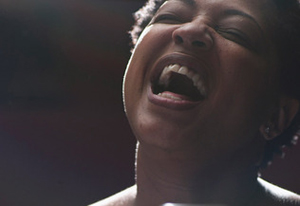Archive | Feminist Matters
20 Feet From Stardom Is the Absolute Best
20 Feet From Stardom, Morgan Neville’s documentary about backup singers, deserves an objective review because without any qualifications it is the finest film of 2013 thus far. It channels its subjects’ greatest strengths—big wind, an uncanny ear, a fastidious work ethic, a knack for knowing when to sing and when to stop, and an indomitable spirit—and in doing so pulls back the curtain on a rarely considered world, which is the very best function a documentary can fulfill. What’s more, by suggesting with an infectious, clear-eyed joy how this world connects to everything else, it fulfills one of the very best functions of any movie.
But part of what makes this film so extraordinary is that it summons really personal responses. I’ve seen it twice so far and during both screenings the audiences—full of professional critics!—spontaneously burst into applause and tears more than once. God knows I cried through both showings.
At this point I’ll come clean with my own association with the material. My father, an atheist-Jewish computer science professor hailing from lily-white Massachusetts, has had a lifelong romance with R&B, soul, doo-wop, gospel, blues. Certainly he’s not the only Jewish man in his generation to evince a passion for what’s still sometimes known as black music (I won’t even get into how complicated that is) but his commitment has proven steadfast and often endearing. In our family a Sam Cooke or Aretha Franklin album was always spinning on the turntable or pouring out of the car speakers. And at every opportunity he sang those songs himself, warbling in his cracked, earnest falsetto while I did backup.
He taught me young. Starting around 5 or 6, I learned to listen closely so that whenever he’d break into a lead I could chime in with the right oohs, ahhs, babies. I’d croon “No, no, no” while he’d howl Frankie Lymon’s “I’m Not a Juvenile Delinquent.” He’d sing “Respect” and I’d add, “Just a little bit,” just like Aretha’s sisters did. Did I want to sing lead? Not really. I was a daddy’s girl who was fiercely proud to support him as he sang his heart out. But as I began to come into a limelight of my own—around age 11 I started doing some TV spots—my father and I began to part ways. I couldn’t help but observe he preferred to sing lead in his own house, and from this I learned the classic lessons of the backup singer: that sometimes it was better to blend than to shine, that adaptation was necessary for survival, that you had to know when to cut your losses, and that I loved the music for its own sake, regardless of whether I could gain any rewards by doing so.
So I get backup singers. And the dynamite news is that Morgan Neville does, too. He doesn’t trip over himself as he carefully builds the arcs of these individual women’s lives into something that is, fittingly, bigger than the sum of its parts. Starting with a credit sequence in which he slyly reappropriates artist John Baldessari’s work by applying dots to the lead singers in vintage R&B images, Neville draws upon whatever works best to tell this ultimate underdog story. He enlists some of the biggest names in the music business—Sting (poncey as ever), Bruce Springsteen, Stevie Wonder, Mick Freaking Jagger—to lay out the enormity of these women’s contributions to the twin canons of rock and roll and R&B. Wisely, though, he mostly lets the women speak for themselves. Continue Reading →
My Testament: Fiona Shaw’s Mary Is Not My Mary
 Now that The Testament of Mary, actress Fiona Shaw’s latest theatrical collaboration with director Deborah Warner, has closed after only a few weeks, it’s probably poor form to stomp upon its grave. But stomp I shall. This Broadway adaptation of Colm Tóibín’s novel about Jesus’ mom after his crucifixion proved so bottomlessly negative that, if it’s slightly blasphemous to kick a play when it’s already down, then at least blasphemy about purported blasphemy may amount to a double-negative positive. Pretty to think so, anyway.
Now that The Testament of Mary, actress Fiona Shaw’s latest theatrical collaboration with director Deborah Warner, has closed after only a few weeks, it’s probably poor form to stomp upon its grave. But stomp I shall. This Broadway adaptation of Colm Tóibín’s novel about Jesus’ mom after his crucifixion proved so bottomlessly negative that, if it’s slightly blasphemous to kick a play when it’s already down, then at least blasphemy about purported blasphemy may amount to a double-negative positive. Pretty to think so, anyway.
There’s not much more pretty to be found in this production, which features a Mary who’s hardly a picture of beatific peace and purity. Pacing the room to which she’s been relegated since her son’s death, she smokes, drinks, bellows, gnashes her teeth, matter-of-factly strips, and calls bullshit left and right. This is a Mary who’s not buying the claim that she gave birth to the son of God. If she were the type to pun—and she’s too pissed off for such folly—she’d likely call the fallout from his death a crucifiction.
Before the play officially begins, Shaw sits, uh, mum in a centerstage elevated glass box, draped in soft flowing fabrics and decorously posed, the very picture of the Mother Mary statues flanking every corner of my Italian-American neighborhood. Audience members from the orchestra seats file onstage to ogle her and the haphazard set: furniture upturned, books and barbed wire strewn wily-nily on the floor, and old newspapers stacked in piles upon piles—the international sign for “crazy person.”
But once the lights darken and everyone settles back into their seats, the box lowers and Shaw steps from her throne, instantly breaking the reverie. “They want to know what happened,” she says, drawing in on a cig and exhaling slowly. “Memory has filled my body.” It’s clear it’s an unwelcome invasion. Pacing the stage fitfully, she changes her clothes frequently, as if she were trapped in that state of misery and rage and discomfort when nothing feels right, not even your own skin stretched across your skeleton.
Slowly, her version of her son’s transmutation emerges. It is not unlike the story of many women who feel abandoned and betrayed by their offspring. Her sweet son grew too big for his britches. He got mixed up with the wrong crowd, dangerous people who encouraged his folly and led him to trouble. He disrespected her in front of others. He flew the coop and never came back. In her dotage she has been abandoned with no creature comfort, not even the sanctimony of the blameless, for she is horrified by how she abandoned her son as he died upon the cross.
She speaks in hoarse, ragged tones, and when she really gets up in arms, screams a smoker’s impotent scream. It is totally empty of force. “He used such strange, proud words,” she rages. “He said, ‘Woman, what am I to do with you?’ But I am not one of his followers.” When she relays how he changed water to wine, she scours the event for evidence of his manipulation. Where did those kegs of water come from? she wonders. It all seemed a little, well, convenient, didn’t it? She’s your standard impossible-to-please mother here, blaming everyone, including herself, and nurturing none. A Thoroughly Modern Mary, disenfranchised and alone. You can practically hear Shaw, Warner, and Tóibín slapping themselves on the backs for their radical subversion of the Good Mommy paradigm that forms the backbone of Christian mythology. Continue Reading →



